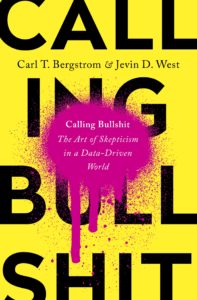By Wanda Deschamps (November 4, 2020)
Calling Bullshit: The Art of Skepticism in a Data-Driven World, Carl T. Bergstrom and Jevin D. West, Random House, August 4, 2020, 336 pp., $35.65

We associate the three-kinds-of-lies quote with 19th century American humourist Mark Twain. It was almost as if he was peering into the future while saying it because we do not know what to believe in our technologically centred 21stcentury.
And it’s getting worse.
Calling Bullshit: The Art of Skepticism in a Data-Driven World by Americans Carl T. Bergstrom and Jevin D. West is a welcome critique.
The title immediately intrigued me. As a woman with autism, I am known to be hopelessly honest, so I yearned to know more about a book calling out falsehoods. Then my insatiable curiosity drew deeper.
Why would an evolutionary biologist (Bergstrom) decide to co-publish about the lack of veracity with data? The opening lines of the preface leave no doubt that the authors view several key institutions and realms lacking veracity from politics to science to innovators to higher education learning. The reader is left wondering if any sector remains based in truth.
“The world is awash with bullshit, and we’re drowning in it. Politicians are unconstrained by facts. Science is conducted by press release. Silicon Valley startups elevate bullshit to high art. College and universities reward bullshit over analytic thought. The majority of administrative activity seems to be a little more than a sophisticated exercise in the combinatorial reassembly of bullshit.”
My question was answered: Why wouldn’t someone who researches populations be motivated to tell this story?
So, what is bullshit?
Harry Frankfurt, the author of On Bullshit described it as what people “create when they try to impress you or persuade you, with no concern for whether what they are saying is true or false, correct or incorrect.”
How is bullshit different from a lie? A lie takes the truth seriously. Bullshit does not.
The authors of Calling Bullshit put you at ease, noting that readers do not require academic bona fides similar to the authors to become enlightened about the topic,
“…you do not need to be a professional statistician or econometrician or data scientist to think critically about quantitative arguments, nor do you need extensive data sets and weeks of effort to see through bullshit.”
Generally, I agree although, knowledge in math and computer science would certainly aid in a deeper understanding of some of Bergstrom and West’s illustrations. Most are easily understandable and transferable to one’s day to day. From football locker room photographs, to early teenage dating tales to claims of small university class size, they walk you through example after example of how easily misperceptions and, therefore, falsehoods are spread.
So, how did we get here?
For better or for worse, “bullshit is not a modern invention.”
Bergstom and West invoke the Greek philosopher Plato to provide evidence.
“In one of his Socratic dialogues, Euthydemus, Plato complains that the philosophers known as the Sophists are indifferent to what is actually true and are interested to only winning arguments. In other words, they are bullshit artists.”
If bullshit has existed for thousands of years, social media is only perpetuating it.
Are there any positives to the BS story? Yes. The fact we are talking about it is a good thing. Beyond that, the book’s concluding chapter Refuting Bullshit is a step-by-step guide on how to challenge BS, with instructions on how to do it nicely. “Be charitable. Admit fault. Be clear and Be pertinent are some of the suggestions.”
Calling Bullshit is an unlikely read for a leisurely winter weekend afternoon.

Photo: © Kris Tsujikawa
It is better suited as a guide stored on your office shelf to use as a reference – perhaps even as a retreat – when the latest piece of fake news lights up your feed. With 11 chapters, from Bullshit Everywhere to Refuting Bullshit, you will be well armed to question. This book, published in August, may be the best new piece of ammunition against misinformation.
For those who are keen on learning more, Bergstrom and West teach a virtual university course Calling Bullshit: Data Reasoning in a Digital World at the University of Washington where West is also the Director of the Centre for an Informed Public (or so his LinkedIn profile states).
The FAQs included in the course syllabus are worth a look. I anticipate learning more from these science professors over time. Their work is a service to our society.
(Wanda Deschamps is founder and principal of Liberty Co, a consultancy working to increase the participation level of the neurodiverse population in the workforce.)
Also reviewed by Wanda Deschamps
The Conscious Creative: Creating your own values-driven practice October 6, 2020
The Power of Disability: A book about life, June 9, 2020
I Overcame Autism: Moving autism further into the public conscience, April 28, 2020